Entering Azerbaijan felt (to me – Ginevra – at least) like finally reaching uncharted territory. Apart from a vague notion that it has a bad reputation for human rights (not that I could put any details to that judgement) I knew nothing of the country other than it was a majority Muslim former Soviet state, that it had a lot of oil, and that quite a lot of it was desert.
With the now-familiar twinge of regret, I decided in the border town of Lagodeki that bringing a final pack of delicious, fatty Georgian bacon into Azerbaijan in Ramadan was probably a bad idea, especially when we had accommodation (and hence a shared kitchen) booked for the first night. The temptation to blow our last few lari on the most expensive bottle of Georgian brandy in the shop was, however, too great to resist, especially when even the excellent 8-year old cost a mere £8.
Our concerns over causing offense during Ramadan turned out to be unfounded, as Azerbaijan seems pretty relaxed about its Islam, perhaps thanks to its officially secular Soviet history, or to its longstanding position as a gateway between Europe and Asia. Although clearly many people were fasting, restaurants seemed well-attended at lunch time, and most little corner stores are well stocked with cheap vodka and a reasonable selection of beers. Repeated enquiries as to whether we’d offend anyone by eating picnics at lunch time were met with reassurances that it was fine – once we were even invited to picnic in the welcome shade of trees in the grounds of a mosque!
Generally, Azerbaijan seemed a mix of what were by now more familiar cultures. On the one hand, there was clearly a strong connection to Turkey: a fairly laid-back Islamic culture, a language similar enough that the Turkish I’d already learned got us by nicely, and restaurant menus dominated by kebabs. Mint ayran, to my delight, was sold in every shop. But on the other hand, like Georgia, every shop also offered a dizzying selection of vodkas (imagine reversing the ratio of wine brands to vodka brands in British supermarkets) and Ladas in every colour of the rainbow were liberally scattered among the slick Mercedes and Audis of the oil-rich Baku-ites.
Bubbling under the surface were hints of a more authoritarian approach. The officers at the border were pleasant enough, and the junior ones enjoyed tooting my bicycle horn, but our map of Georgia, which was opened to a section that also included Armenia, triggered a short but intensive interrogation about whether we’d entered that country (with which Azerbaijan has had very troubled recent relationships).
As far as authoritarian edicts go, the sign on the border post forbidding passers-by from dropping litter was a welcome sight, although it was unclear whether it referred to the border compound or the entire country ahead. Perhaps the latter – for the first time since Switzerland we found the roadsides, rivers and woods relatively clear of rubbish. They were, however, brightened up by regular posters depicting the former president, Heydar Aliyev, father to the current president and officially touted as the founding father of the nation (despite the inconvenient and carefully ignored fact that there were 2 elected post-Soviet presidents before him).
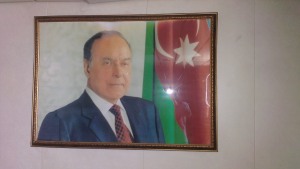
Portraits of former president Aliyev are liberally scattered across the land (this one was in the lounge of the boat across the Caspian)
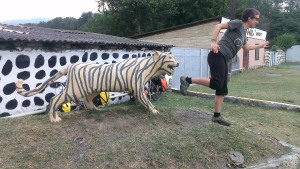
Although we didn’t see any of the African penguins from Tbilisi zoo that had been spotted on the Azerbaijan border, we think we may have found one of their missing tigers
Our first day in was an insanely tough haul to Sheki, which was much further than it looked on a map, and steeply uphill for the last 15km. To make things worse, the accommodation we’d booked in the nearby village of Kish was another 6km out from the town, up into the mountains. About 100km into the day, as evening drew close, we were spotted by some other cycle tourists, an Italian-French couple Marco and Tiphaine, who invited us to stop with them at the café where they were camping. But having made the reservation, we didn’t want to mess the guesthouse owner around and pressed on, hoping to meet them again in Sheki, where we were planning to take a day off. Big mistake.
The next 35km were sheer hell – I was a quivering wreck by the end, half convinced I was actually stuck in a nightmare where I had to cycle eternally uphill in the dark with drunk drivers swerving precariously around me, only to culminate in a desperate and long stumble pushing the bike up through steep, narrow, pitch-black village streets paved with vicious cobbles slick with running water and cow slime. There genuinely seemed no end to it. We arrived in Ilhana’s rather jolly guesthouse well after midnight with me in tears and John shaking with exhaustion, having probably inconvenienced Ilhana far more by keeping her up waiting for us than we would have by re-booking for the following night.
The next day proved the haul up was worthwhile – Kish was a delightful little village, with narrow streets and high-walled neighborhood compounds, fantastic mountain views and a gorgeous little 13/14th century Caucasian Albanian (apparently nothing to do with Albania the modern country) church, which claims to have origins as a holy Christian site dating back to the 1st century. Whether this claim is true or not, archaeological excavations have revealed that it was an ancient cultic site long before the advent of Christianity.
Sheki was a top place for a day off. The Xansarai (Khan’s Palace) is a real hidden gem: a tiny but intensely decorative royal residence, glittering on the outside and cool on the inside with wood-framed stained glass windows and intricate frescos depicting flowers, battle and hunting scenes and phantasmagorical creatures such as flower-breathing dragons and push-me-pull-yous. (No photography is allowed inside, so the internal pictures are pinched from online sources).
Unfortunately, due to an inconveniently-timed and uninteresting international music festival, we couldn’t book into the famous Caravansarai Hotel – a carefully restored “caravan palace” where silk road merchants, along with their camels, once took refuge from the desert heat and desert bandits. Barred from entering while the afternoon’s concert was taking place, we were allowed in for a cup of tea and a shisha later that evening.
We bumped into Tiph and Marco in town, and arranged to meet the next day and cycle on together. This marked a definite change of pace for us, since they generally cover about 50km a day, compared to our 60 – 90km target. Despite some lingering concerns over how long we’d need to spend in Baku waiting for Uzbek visas and chasing down the elusive boat across the Caspian, we made the most of good company and two stoves to cook on, happily discovering Marco was as enthusiastic about good cooking as us. In any case, taking things a bit easier was welcome as the heat was really beginning to build even in Azerbaijan’s relatively cool highlands, and long lunchtime siestas in the shade were becoming a necessity (though the demands of Marco’s Mediterranean constitution to doze after lunch also had a strong influence).
Playing fiddle for the locals:
Each village we rolled past seemed to have a local “thing” that they sold. There was the village of tandoors, where the road was lined with round wood-fired ovens producing fantastic salty hot flatbreads; pickle villages where residents touted jars of multi-coloured preserves; villages where the local craft of choice was flat circular fruit jellies in shades of red, orange, yellow and brown; and of course endless melon stalls.
The highlands even provided some proper forest, where the cicadas were so loud we had to shout to hear each other. At first I thought I’d developed a lisp, perhaps a result of drier air making my tongue thick, until John pointed out this was an illusion caused by the fact our sibilants were being drowned out by the insects.
They quietened down after dark, allowing the sound of boars rummaging around rather close to the tent to be quite clearly audible. Trips out to pee were cautious and close to the camp, though we suspected the boars were probably more keen not to meet us than us them.
Temperatures were rising, and we lingered in the highlands as long as possible, leaving the 95km-long ride down and across the plains for the final day before Baku.
Towards the end of our final day in the hills, a big headwind began to build, boding ill for our monster day across the desert into Baku. The next day it had shifted around somewhat to a bracing if warm cross-wind, which still made cycling hard but at least kept us cool in the blazing heat. Now, it’s an odd phenomenon that while major roadworks are a major pain in the bum for motorists, once in a while they’re a real boon for cyclists – specifically where the tarmac has been laid but cars aren’t allowed on it yet. The gods of the road were with us that day: most of the last 80km of road to Baku was in the last stages of being built, allowing us to cruise along empty, brand new asphalt in a diagonal formation to take turns bearing the brunt of the cross-wind (though in practice John seemed to relish riding point most of the time).
Happily, the cross-wind meant everyone in the peloton got a great view (by now I was getting quite tired of spending windy days staring at John’s back), and the views were indeed great as we rolled down from the mountains and into the desert.
After many miles of very little, just as we were starting to feel exhausted and hungry and hot, we came to a restaurant, and no sooner had we leaned our bikes up we were adopted by a gang of Turkish and Azerbaijani road construction workers. Their ‘boss’ as they called him was a young Turkish guy in his early 20s, who despite being fresh out of university had clearly won the respect of the whole crew with his mix of good education and pleasant, humble demeanor. They insisted on paying for our lunch and left us to our siesta.
Rural Azerbaijan had not seemed particularly impoverished – towns had been well-built, with good infrastructure, even if life in the villages looked a bit tougher. But Baku itself was clearly oozing with oil money. Many millions had clearly been recently invested into slickly-presented parks and waterfront boulevards, as well as some dramatically-lit sky-scrapers:
https://www.youtube.com/watch?v=s3nfIZL4XiQ
The Baku attitude rural Azeris had warned us of – that Baku-ites only cared about money – seemed clearly in evidence, with every other bar a “VIP” lounge (importance of course being measured in wealth), and an endless stream of boutique fashion shops.
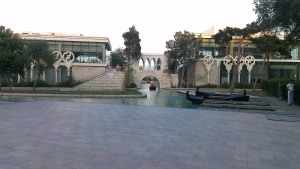
Little Venice – you can hire a gondola fully-equipped with a stripey-shirted gondolier to punt you around
On the plus side, the Russian-era stone buildings had been carefully restored – the city may have lacked the romance of Tbilisi’s crumbling elegance, but at least its grandeur seemed likely to outlive the decade.
The luxury even pervaded our very reasonably-priced (for Baku) hotel, the Baku Palace. Having taken over the former apartment of a Baku grandee, the owners kept all the fittings and features – elegant curtains, chandeliers, imaginative plasterwork and a white grand piano (one of the main draws for staying there though it proved sadly neglected). But as well as pricy private rooms, the owners ran a dormitory – one of the best in Baku by most accounts – and we were lucky enough to score a “2-bed dorm room”, which basically meant we had a private room with a shared bathroom, for $18 per person per night (about as good as it gets in that city).
The old town, hidden behind high defensive walls, was very charming and again, well-restored if perhaps a bit too cleaned up to really capture the atmosphere of its past life.
The old town also boasts an ancient hamam (public bath) which has alternate days for men and women. Happily (since John was not keen to get naked and bathe with strangers he didn’t know how to speak with) it was women’s day. The ladies hanging out by the door called me in as we ambled past and virtually insisted I leave John to his own devices for an hour and come in for a bath and massage. The bath-house itself was a large polygonal room with taps around the side and 2 hot rooms – a dry room and a sauna – off to the side, and the full-body massage very welcome, even after 5 days off the bike.
Meanwhile, Tiph and Marco’s Warm Showers hosts were feeling unecessarily guilty about being unable to host us too, and asked a friend, Enes, if he could put us up. So after 3 nights in the Baku Palace, we headed gratefully across town to Enes’s tidy bachelor penthouse flat, where we met his delightful friend Pushy the Persian Pussy who seemed to relish having company during the day while Enes was away at work.
Not only was Enes a fantastic host, but as a director of the Azerbaijan branch of Arcelik (a Turkish white goods company sensibly renamed Beko for its European operations) he offered to organise a van to get all four of our bikes to the port when the time came – a massively helpful gesture. The ferry across the Caspian is a curious thing. Not only does it not run to any schedule (usually a boat turns up about once a week) but ships have recently started leaving from Alat, a new port 70km south of Baku. As they are primarily cargo boats, there are only berths for 12 passengers. Departure is only announced on the day, you can’t buy tickets in advance, and the location of the ticket office changes regularly. All this adds up to an immense amount of stress for, well everyone trying to catch the boat, but cycle tourists in particular, since 70km is a full day’s ride and the winds are unpredictable and strong. The most common option is a taxi, at $50 a pop for 2 bikes and 2 passengers. With Enes’s help, we were able to transport all 4 bikes and share the taxi fee (which he negotiated down to $40) between the four of us.
And suddenly it was all happening at once! Our visas arrived on the same day as Tiph and Marco’s, and a boat had apparently manifested in Baku as well. In scenes reminiscent of the Hitch-hiker’s Guide to the Galaxy (where notice of the impending demolition of Arthur Dent’s house was posted in the basement of the town hall in a disused toilet with a sign on the door marked ‘Beware of the Tiger’), on this particular day the ticket office was located in a construction site in a compound surrounded by 12ft hoardings guarded by security who didn’t know there was a ticket office inside and tried to direct us across the other side of the city. Luckily, Tiph and Marco had somehow already managed to locate it and sent us the GPS coordinates, so we were able to stick to our convictions and find a way in around the other side of the compound where the guards actually knew what they were guarding. For some reason we had to leave our bikes outside the compound and walk 1km through the blazing sun to get to the unmarked but air-conditioned portacabin. When we stuck our heads around the door, we were immediately driven curtly back out into the midday heat by a surly/stressed Russian woman and told to wait outside while they issued tickets to three Turkish foot passengers, which for some reason took about an hour.
When we finally were permitted entry, we were told emphatically we had to get to the port for 6pm at the latest or they couldn’t guarantee the boat wouldn’t leave without us. It was already 2pm, so panic ensued. John flew off in the hottest part of the day to pay for the visas (which had to be done at a particular bank on the day they are issued) and then the Embassy, which was over the other side of town up a massive hill, while I bought the tickets, contacted Enes to organise the van and got hold of Marco and Tiph to arrange a pickup point, then headed back to the flat to start getting our bags and bikes downstairs.
Progress around the city was somewhat hindered by the police, who are desperately trying to enforce an bizarre new law that says cyclists can’t ride on the roads in Baku and have to stick to the pavements (pedestrians, steps and a general lack of dropped kerbs not withstanding). The best way to deal with this ridiculous edict, we found, was to smile politely, ride on the pavement until out of sight, then hop back on the road again; nevertheless, it was the last thing we needed to deal with that particular day.
But in the end, it all came together, and we arrived just after 6pm, where we were delayed in passport control for another hour, partly by the fact that the Azeri Embassy in Tbilisi had managed to register me as male in my visa. We were pleased to find that not only was the boat still there, but we were sharing it with train carriages…
… and irritated (but unsurprised) to find, after all that stress and rushing around, it didn’t embark until well after 10pm. Nevertheless, a beautiful sunset, and the knowledge that we’d made it through Baku with Uzbek visas and a boat in a mere week were ample compensation.
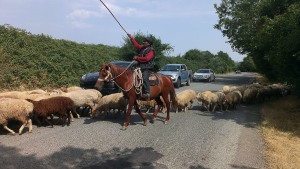
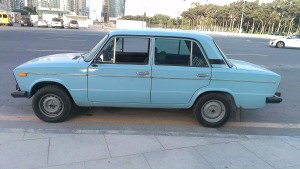
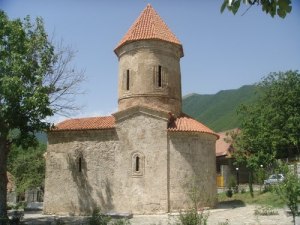
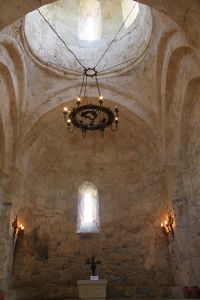
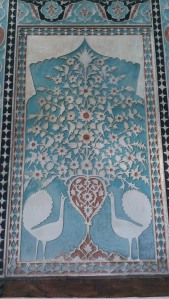
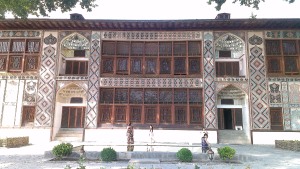
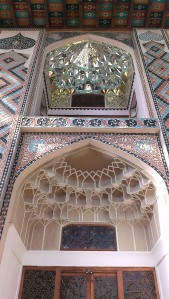
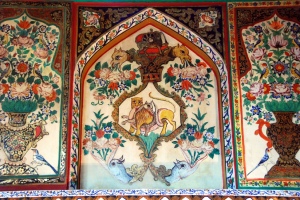
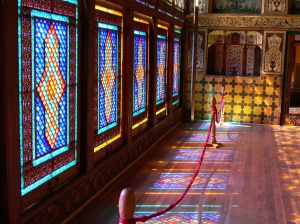
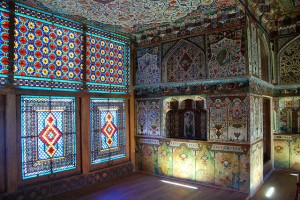
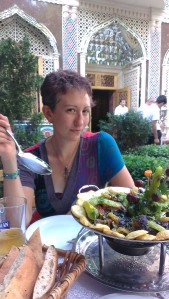
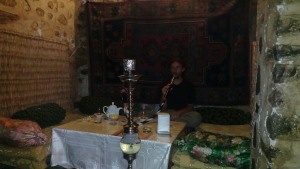
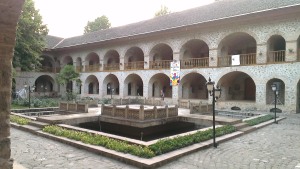
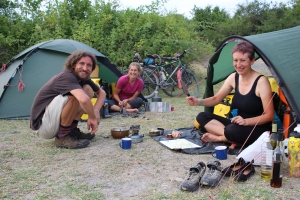
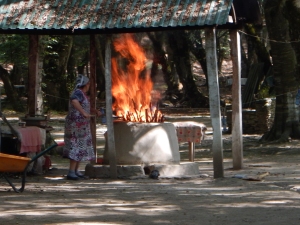
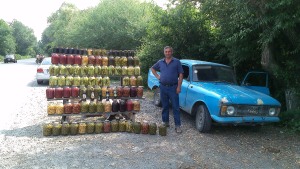
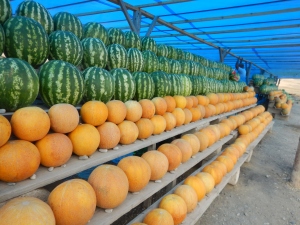
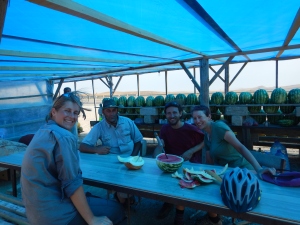
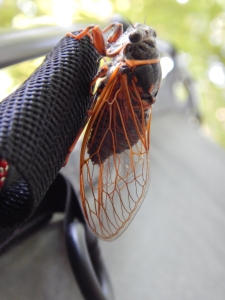
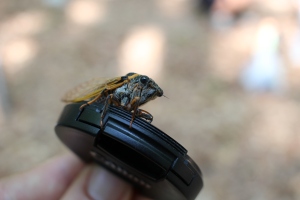
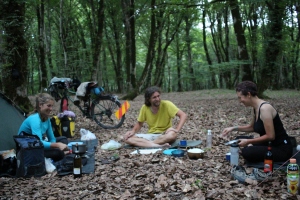
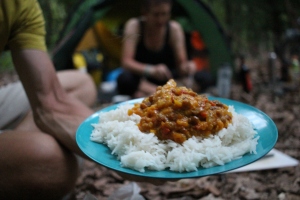
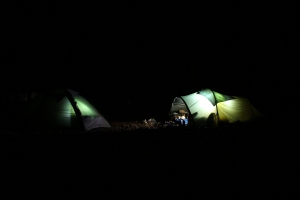
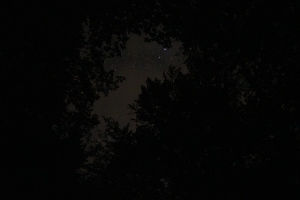
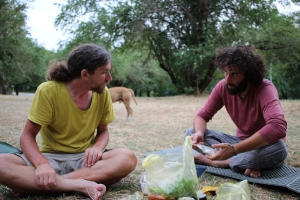
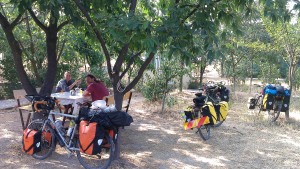
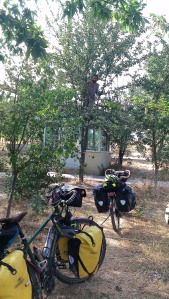
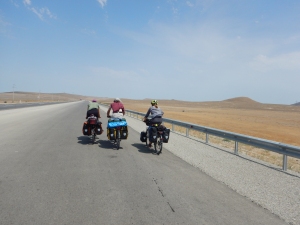
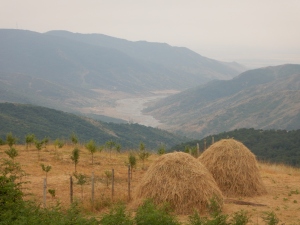
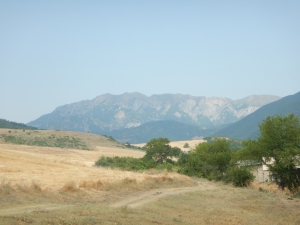
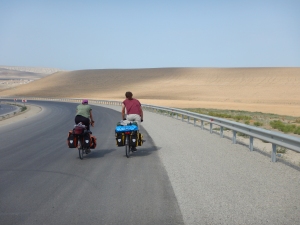
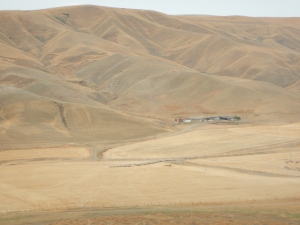
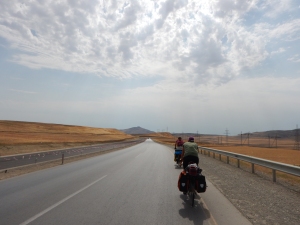
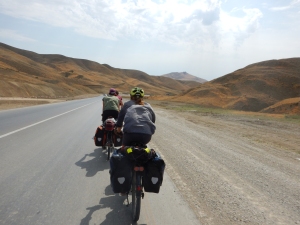
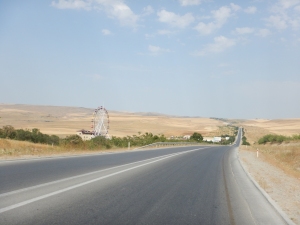
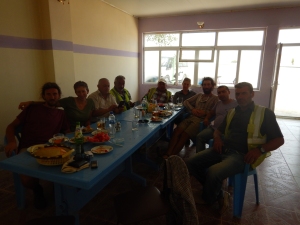
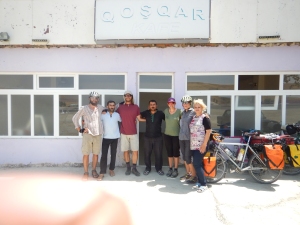
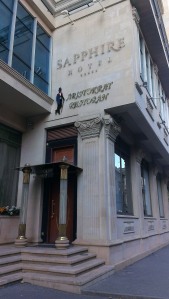
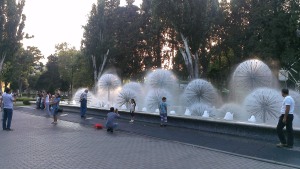
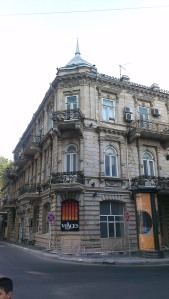
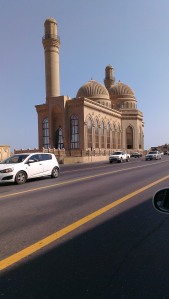
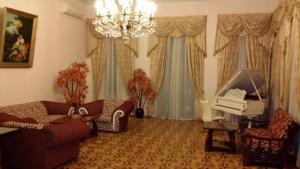
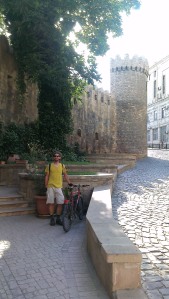
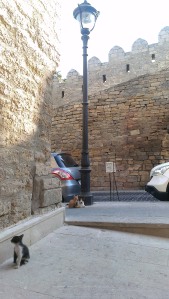
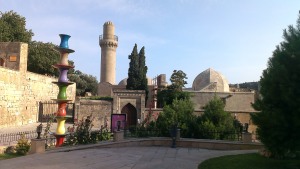

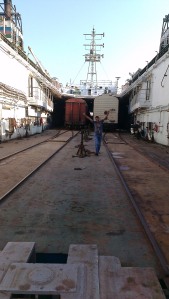
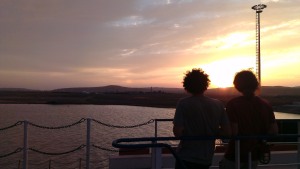
wow – just caught up with the last few posts. Sorry I’ve been a bit remiss. But now fully up to date! Really fantastic blog. Very exciting. So of course you guys really need to write a book. Perhaps when you return (if?) or at some point when you’ve come to some kind of stasis, destination point. It’s very interesting and full of stories. I can imagine there’s much more that you just haven’t had time to blog about too. Can’t wait for the next entry. It’s great to hear about all theses places that I’ve actually never heard of – such as Baku!
LikeLike